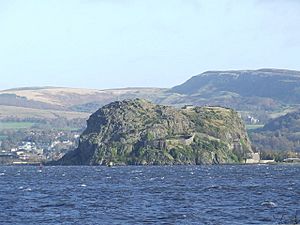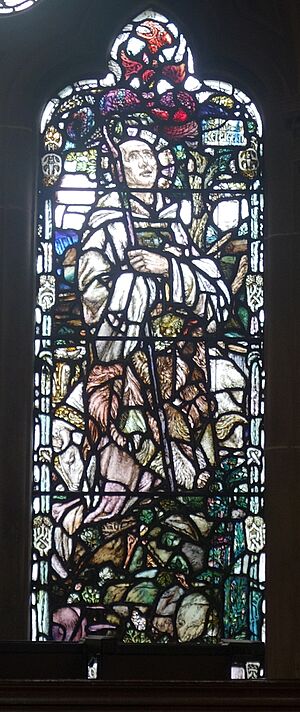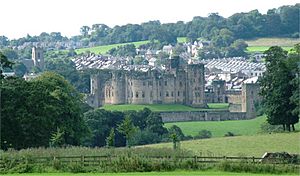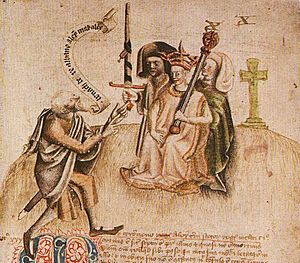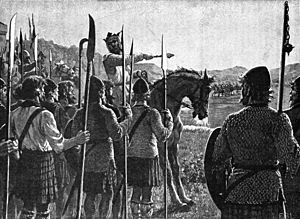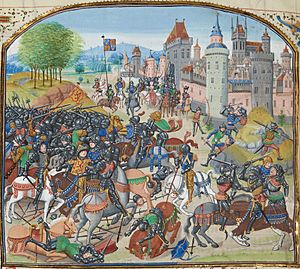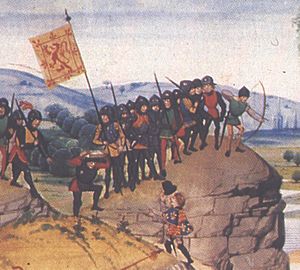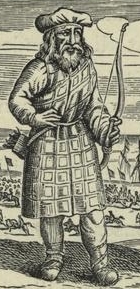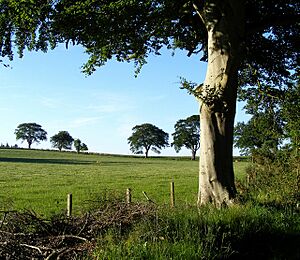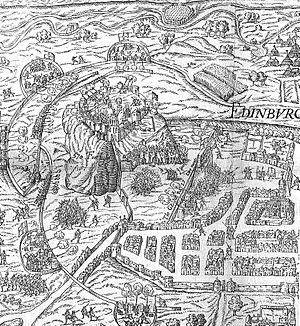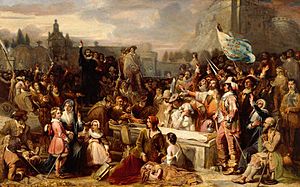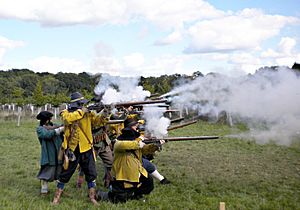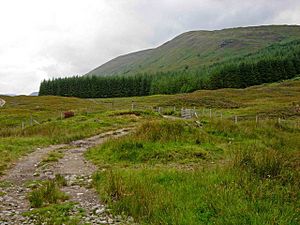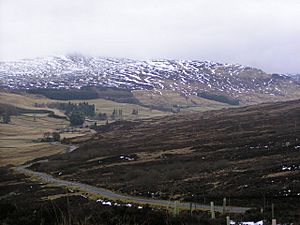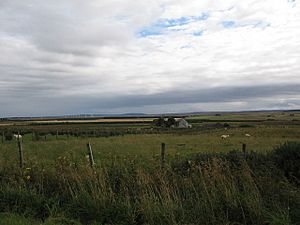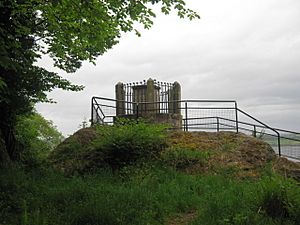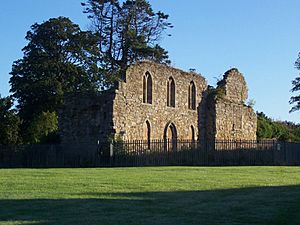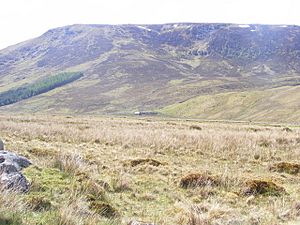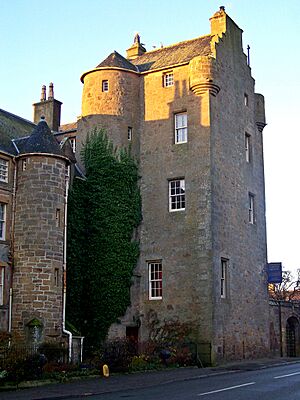List of wars involving Scotland facts for kids
The Kingdom of Scotland had a long and exciting history, full of battles and conflicts! This article lists the many wars, civil wars, and clan fights that Scotland was involved in before it joined with England to form the Kingdom of Great Britain in 1707. If you want to know about wars after 1707, check out the List of wars involving the United Kingdom.
Contents
- Scotland's Early Conflicts: 10th and 11th Centuries
- Scotland's Medieval Battles: 12th Century
- Scotland's Defining Wars: 13th Century
- Scotland's Later Conflicts: 14th Century
- Scotland in the 16th Century
- Civil Wars and Revolutions
- Macbeth's Rise to Power
- Dubh's Rebellions: Lords of the Isles
- Marian Civil War: Queen Mary vs. Her Son
- Bishops' Wars: Religious Conflict
- English Civil Wars: Scotland's Role
- Glorious Revolution: A Change of Kings
- Jacobite Rebellions: Supporting the Old Royal Line
- Clan Conflicts: Fights Between Families
- MacDougall vs. Campbell: A Bloody Ford
- Cameron vs. Mackintosh: A Long-Running Dispute
- Wolf of Badenoch's Raids
- Mackay vs. Gunn: Northern Feuds
- Royal vs. Black Douglas: A Power Struggle
- Gordon vs. Lindsay: Abbey Battle
- Munro vs. Mackenzie: Control of Ross
- Fraser of Lovat vs. Mackenzie: Border Disputes
- Munro vs. Mackintosh: Passage Money
- Gunn vs. Keith: A Trial by Combat
- Mackay vs. Ross: Church Burning
- MacDonald vs. Maclean: Internal Clan Fights
- MacDonald vs. Mackenzie: Tactical Draw
- Cunningham vs. Montgomery: High-Profile Murders
- Mackay vs. Sutherland: Northern Power
- Sutherland vs. Sinclair: Sieges and Surrenders
- See also
Scotland's Early Conflicts: 10th and 11th Centuries
Scotland faced many challenges in its early days. These included invasions from powerful neighbours and important changes within the country itself.
Athelstan's Invasion: A Fight for Freedom
The invasion by Athelstan (934–937) was a big event. Athelstan was the King of England, and he wanted to control more land. Scotland, along with its allies from Norse-Gaelic groups, the Kingdom of Strathclyde, and the Kingdom of Dublin, fought against him.

Even though Scotland lost the final battle at Brunanburh, Athelstan's plans to take over Scotland and Strathclyde didn't work out. So, it was a partial Scottish victory because Scotland kept its independence!
Strathclyde Joins Scotland
Around 1034, Scotland achieved a Scottish victory by taking over the Kingdom of Strathclyde. This made Scotland bigger and stronger.
Duncan I's Defeat in Northumbria
In 1039, King Duncan I led an invasion of Northumbria, which was part of England. Sadly, Scotland suffered a Scottish defeat at the Siege of Durham.

Norman Invasion: A New Challenge
The Norman invasion of Scotland in 1072 was part of a larger Norman takeover of Britain. William the Conqueror, the new King of England, marched into Scotland.
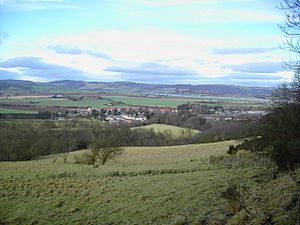
This resulted in a Scottish defeat. Malcolm III had to agree to William I being his overlord in the Treaty of Abernethy. However, Malcolm still made raids into England later on.
Scotland's Medieval Battles: 12th Century
The 12th century saw Scotland dealing with internal rebellions and major conflicts with England.
Óengus's Rebellion: A King's Return
In 1130, King Óengus of Moray tried to invade Scotland in what is known as Óengus's invasion. This was a Scottish victory for King David I. Óengus was killed in battle, and another rebel leader, Máel Coluim mac Alaxandair, was imprisoned for life.
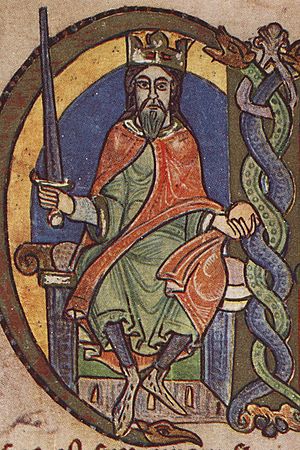
Somairle's Invasion: Defending the West
In 1164, King Somairle of the Isles led an invasion of Scotland in Renfrewshire. Scotland won a clear Scottish victory. King Somairle was killed, which caused a lot of trouble in his own kingdom.
The Great Revolt of 1173–74
The Revolt of 1173–74 was a big rebellion against Henry II of England. Scotland joined English rebels, France, and other groups.
However, it ended in a Scottish defeat. The Scottish King William the Lion was captured at the Battle of Alnwick and became a prisoner of war in England.
Scotland's Defining Wars: 13th Century
The 13th century was a time of major change for Scotland, including a war that shaped its borders and a long fight for independence.
Scottish-Norwegian War: Gaining the Isles
The Scottish–Norwegian War (1262–1266) was fought over control of the Hebrides and the Scottish West Coast. Scotland, led by King Alexander III, fought against the Kingdom of Norway and its allies.
The war ended with the Treaty of Perth. It was an indecisive result, but Scotland gained the Hebrides and the Isle of Man by buying them from Norway. Norway kept control of Orkney and Shetland.
First War of Scottish Independence: A Long Fight for Freedom
The First War of Scottish Independence (1296–1328) was a very important war fought across Scotland, England, and Ireland. Scotland, supported by France and several Irish kingdoms, fought against England and the Lordship of Ireland.
This war was a huge Scottish victory, ending England's military control over Scotland. Scotland effectively won its independence in 1314 at the famous Battle of Bannockburn. The Treaty of Edinburgh–Northampton was signed in 1328, officially recognizing Scotland's freedom. The Bruce family became the new royal family of Scotland, and the border between Scotland and England was set almost where it is today.
Scotland's Later Conflicts: 14th Century
The 14th century brought more struggles for Scotland, including another war for independence and involvement in a massive European conflict.
Second War of Scottish Independence: Keeping Freedom
The Second War of Scottish Independence (1332–1357) was another fight to keep Scotland free from English claims. Scotland, with help from France, fought against England and supporters of Edward Balliol.
This war was another Scottish victory, ending England's claims to rule Scotland. The Treaty of Berwick (1357) was signed. Scotland had to pay a large ransom to get King David II back, as he had been held captive in England for 11 years.
Hundred Years' War: Helping France
Scotland also played a part in the long Hundred Years' War (1337–1453), which was mainly fought between England and France. Scottish soldiers were a key part of French armies, especially after the Battle of Agincourt.
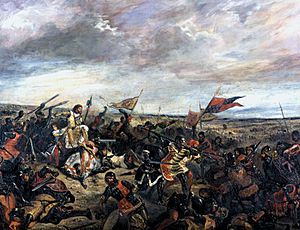
Overall, this was a Scottish victory for Scotland's role in helping France. However, there were some defeats, like the Battle of Homildon Hill, and some victories, like the Battle of Sark, for Scotland in its own border regions.
Anglo-Scottish Wars: Border Skirmishes
The Anglo-Scottish Wars (1377–1575) were a long series of smaller fights and raids along the border between Scotland and England. These often resulted in a stalemate, meaning neither side won a clear victory.
Scotland in the 16th Century
The 16th century brought new challenges, including involvement in European wars and more conflicts with England.
War of the League of Cambrai: A Costly Alliance
Scotland joined France in the War of the League of Cambrai (1511–1513). This led to a major battle on the Scottish Borders.
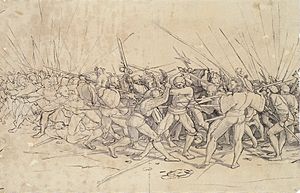
Scotland suffered a big Scottish defeat at the Battle of Flodden, where King James IV was killed. However, France and Venice, Scotland's allies, won the overall war.
The Rough Wooing: England's Marriage Plans
The Rough Wooing (1543–1550) was a period when England tried to force Scotland to agree to a marriage between the young Mary, Queen of Scots and the English prince. This led to fighting in the Scottish Borders.
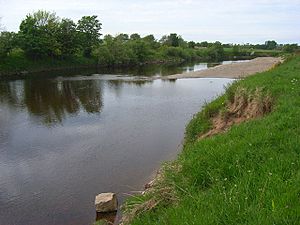
This conflict ended in a Scottish victory. The Treaty of Norham was signed, ending England's military presence in the border areas and giving Scotland full fishing rights in the River Tweed.
Nine Years' War (Ireland): Scottish Mercenaries
Scottish Gaelic mercenaries, known as Redshanks, fought in the Nine Years' War (Ireland) (1594–1603) in Ireland. They supported Irish clans against England.
This war ended in a Scottish Gaels defeat as England won. The Treaty of Mellifont was signed, and many Irish leaders left Ireland in what was called the Flight of the Earls.
Civil Wars and Revolutions
Scotland also experienced many internal conflicts, including civil wars and rebellions, where Scots fought against Scots.
Macbeth's Rise to Power
The invasion of Moray in 1040 was a civil war that led to the victory of Macbeth. King Duncan I was killed at the Battle of Bothnagowan.
Dubh's Rebellions: Lords of the Isles
There were two rebellions led by Domhnall Dubh, a claimant to the title of Lord of the Isles.
- Dubh's First Rebellion (1501–1505) in the Scottish Hebrides was a civil war that ended in a Royalist victory for the Kingdom of Scotland.
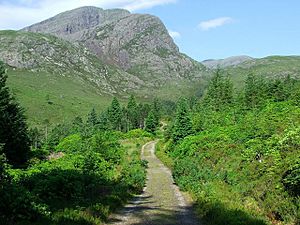
- Dubh's Second Rebellion (1545), also in the Hebrides, was another civil war that ended in a Royalist victory. Domhnall Dubh died in Ireland, ending the hopes of independence for the Hebrides.
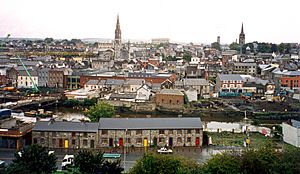
Marian Civil War: Queen Mary vs. Her Son
The Marian Civil War (1568–1573) was a civil war in Scotland between supporters of Mary, Queen of Scots and those loyal to her young son, James VI. England also supported James VI.
This war ended in a civil war victory for James VI. Mary was imprisoned and later fled to England.
Bishops' Wars: Religious Conflict
The Bishops' Wars (1639–1640) were a civil war fought in the Scottish Lowlands. It was mainly about religion, as Scottish Covenanters fought against the Scottish Royalists and England.
The Covenanters won this civil war.
English Civil Wars: Scotland's Role
Scotland was also involved in the English Civil Wars, which had a big impact on the whole of Britain.
- The Second English Civil War (1648) in Northern England was a civil war where Scottish Royalists and Scottish Engagers fought against the Parliamentarians.
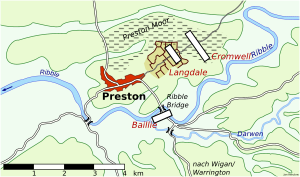
This resulted in a civil war victory for the Parliamentarians. The Scottish forces suffered a major defeat at the Battle of Preston (1648), and Charles I was later executed.
- The Third English Civil War (1649–1651) in Scotland and Northern England was another civil war. Scottish Royalists and Covenanters fought against the Parliamentarians led by Oliver Cromwell.
The Parliamentarians won this civil war. Charles II went into exile, and the republican Commonwealth was set up under Oliver Cromwell.
Glorious Revolution: A Change of Kings
The Glorious Revolution (1688-1689) was an internal conflict that saw James VII replaced as king by his daughter Mary II and her husband William III.
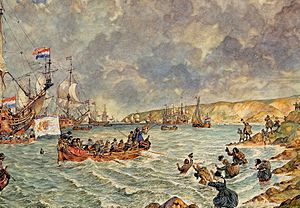
This was a victory for William III and Mary II.
Jacobite Rebellions: Supporting the Old Royal Line
The Jacobite Rebellions (1689–1746) were a series of civil war conflicts in Scotland, England, and Ireland. Scottish Williamites (and later Great Britain) fought against Scottish Jacobites, who supported the return of the old royal family.
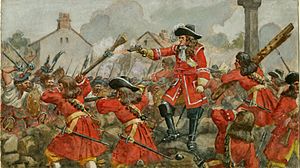
These rebellions ended in a Williamite victory. Key events included:
- The Williamite War in Ireland (1688–91), where the Battle of the Boyne was the last major battle between rival kings.
- The Jacobite rising of 1689 (1689-92), which led to the Massacre of Glencoe.
- Later uprisings in 1715, 1719, and the final Jacobite rising of 1745 (1741–1746), which was defeated.
Clan Conflicts: Fights Between Families
Many conflicts in Scotland's history were not between countries, but between powerful Scottish clans. These were often about land, power, or old rivalries.
MacDougall vs. Campbell: A Bloody Ford
The Clan MacDougall-Clan Campbell feud (around 1294) was a clan conflict during the First War of Scottish Independence.
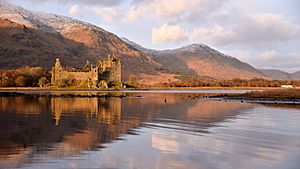
Clan MacDougall won the Battle of Red Ford, where the river was said to have run "red with blood" from the heavy fighting.
Cameron vs. Mackintosh: A Long-Running Dispute
The Clan Cameron-Clan Mackintosh feud (c. 1330–1688) was a very long clan conflict over land in Lochaber and the Highlands.
There were many battles and skirmishes, with no clear overall winner for centuries. It ended with the Battle of Mulroy, a Clan Cameron victory, after which clan warfare mostly stopped in Scotland.
Wolf of Badenoch's Raids
The Wolf of Badenoch feuds (1391) were a clan conflict led by Alexander Stewart, known as the "Wolf of Badenoch."
Clan Stewart of Buchan, allied with Clan Robertson and Clan Mackay, won this conflict against Clan Ogilvy, Clan Lindsay, and Clan Gray. They burned lands, sacked homes, and even burned Elgin Cathedral.
Mackay vs. Gunn: Northern Feuds
The Clan Mackay-Clan Gunn feud (1426–1517) was a clan conflict in Caithness and Sutherland.
Many battles took place with no overall winner. It ended with the Battle of Torran Dubh, a Clan Gunn victory, after which the clans allied against Clan Sinclair.
Royal vs. Black Douglas: A Power Struggle
The Royal-Black Douglas feud (1440–1526) was a major clan conflict between the royal House of Stewart and the powerful Black Douglases.

This was a clan conflict victory for the House of Stewart. The leaders of Clan Douglas were eventually exiled after the Battle of Linlithgow Bridge.
Gordon vs. Lindsay: Abbey Battle
The Clan Gordon-Clan Lindsay feud (1445–1452) was a clan conflict in Angus.
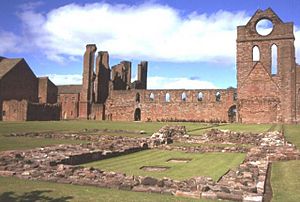
There were two battles. Clan Lindsay won the first, but Clan Gordon won the second, which was part of the larger Royal-Black Douglas Civil War.
Munro vs. Mackenzie: Control of Ross
The Clan Munro-Clan Mackenzie feud (1452–1715) was a long-running clan conflict over control of Ross.
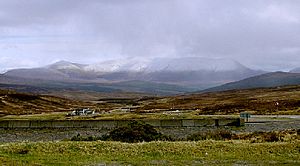
Many battles and skirmishes occurred with no overall winner for centuries. It ended during the Jacobite rising of 1715 when Clan Munro, loyal to the government, forced the Jacobite Clan Mackenzie to surrender.
Fraser of Lovat vs. Mackenzie: Border Disputes
The Clan Fraser of Lovat-Clan Mackenzie feud (1452–1715) was another clan conflict in Ross, often overlapping with the Munro-Mackenzie feud.
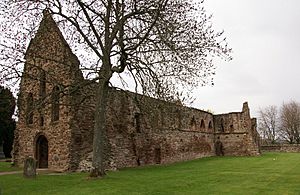
Like the Munro feud, this clan conflict involved many battles and skirmishes. It also ended during the Jacobite rising of 1715 when Clan Fraser of Lovat, loyal to the government, forced the Jacobite Mackenzies to surrender.
Munro vs. Mackintosh: Passage Money
The Clan Munro-Clan Mackintosh feud (1454–1719) was a clan conflict in Inverness-shire that started over a "road collop" (money for passage).
This clan conflict involved two battles and a long rivalry. It ended after the Battle of Glen Shiel, when Clan Mackintosh sided with the British Government, and Clan Munro with the losing Jacobites.
Gunn vs. Keith: A Trial by Combat
The Clan Gunn-Clan Keith feud (1464–c. 1478) was a clan conflict in Caithness.
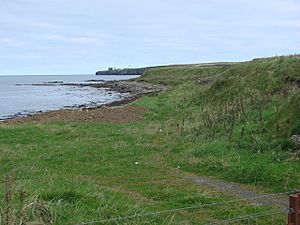
This clan conflict involved two battles, ending in a Clan Keith victory at the Battle of Champions. The clans signed a treaty of friendship in 1978, after 300 years of peace.
Mackay vs. Ross: Church Burning
The Clan Mackay-Clan Ross feud (c. 1480–1550) was a clan conflict in Ross and Sutherland.
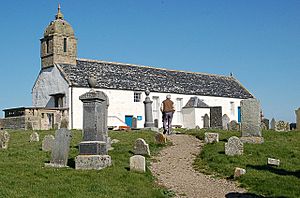
This clan conflict involved many battles, especially in the 1480s. It ended with a raid and massacre by Clan Mackay on Clan Ross in 1550.
MacDonald vs. Maclean: Internal Clan Fights
The Clan MacDonald-Clan Maclean feud (c. 1480–1598) was a clan conflict in Lochaber and the Inner Hebrides.
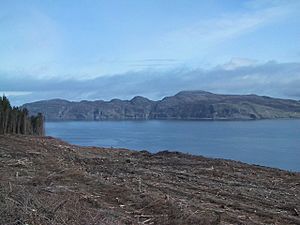
This clan conflict involved many battles, mostly in the 16th century. It ended with the Battle of Benbigrie, a Clan Maclean victory.
MacDonald vs. Mackenzie: Tactical Draw
The Clan MacDonald-Clan Mackenzie feud (c. 1480–1602) was a clan conflict in Ross.
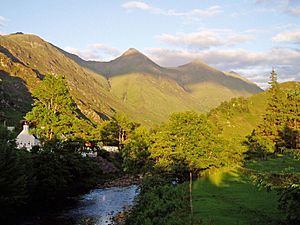
This clan conflict involved many battles, mostly in the 1480s. It ended in a tactical draw at the Battle of Morar, after which both families agreed to peace.
Cunningham vs. Montgomery: High-Profile Murders
The Clan Cunningham-Clan Montgomery feud (1488–1586) was a clan conflict in Ayrshire.
This clan conflict involved many battles and several famous murders, with no overall winner.
Mackay vs. Sutherland: Northern Power
The Clan Mackay-Clan Sutherland feud (1517–1590) was a clan conflict in Sutherland.
This clan conflict involved many battles throughout the 16th century, with no overall winner. It ended with the Battle of Clynetradwell, after which Clan Sutherland focused on Clan Sinclair.
Sutherland vs. Sinclair: Sieges and Surrenders
The Clan Sutherland-Clan Sinclair feud (1570–1601) was a clan conflict in Sutherland.
This clan conflict involved many battles and skirmishes, ending with Clan Sinclair surrendering at the Stand-off at Bengrime.
See also
 | Toni Morrison |
 | Barack Obama |
 | Martin Luther King Jr. |
 | Ralph Bunche |


